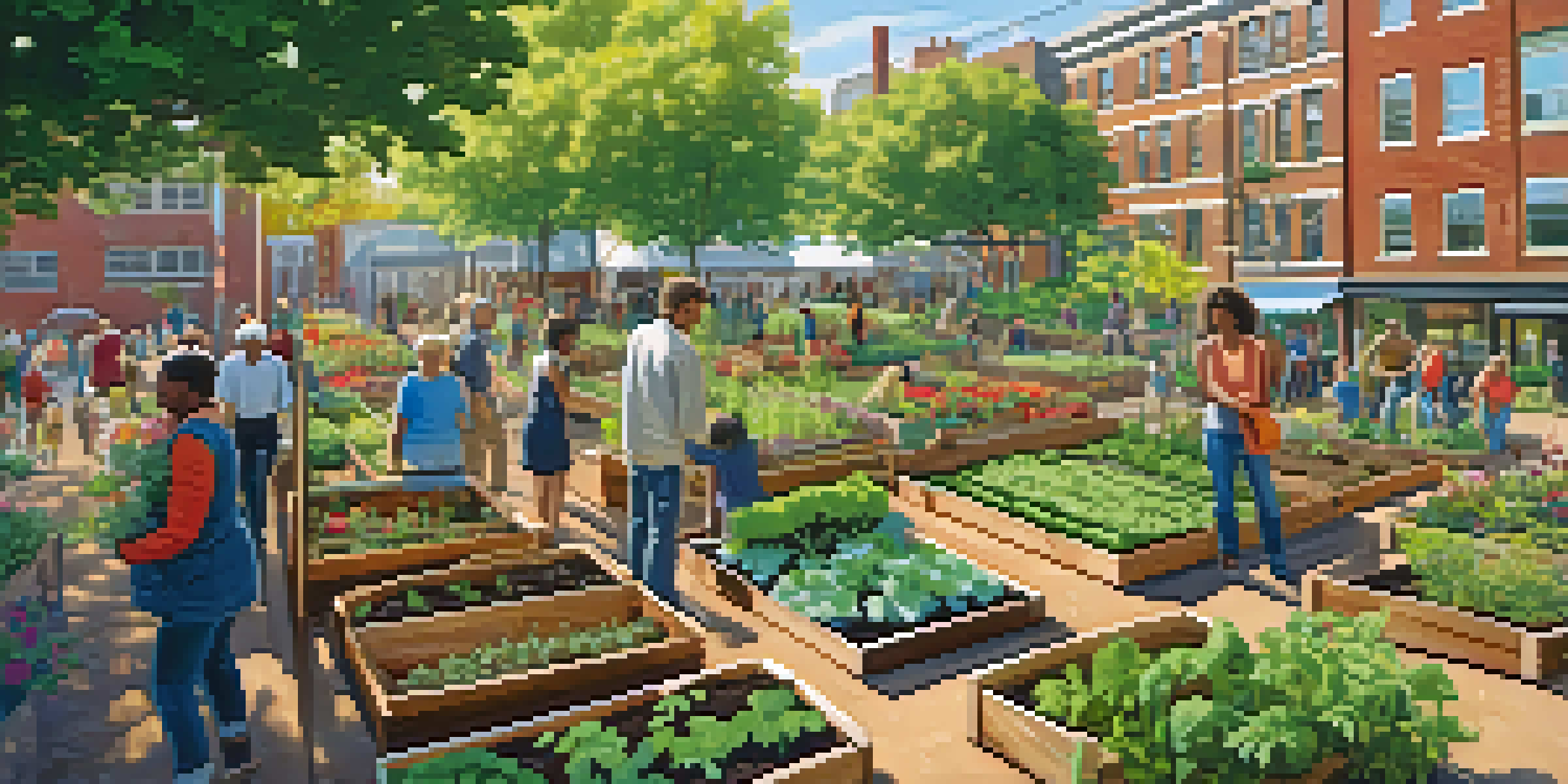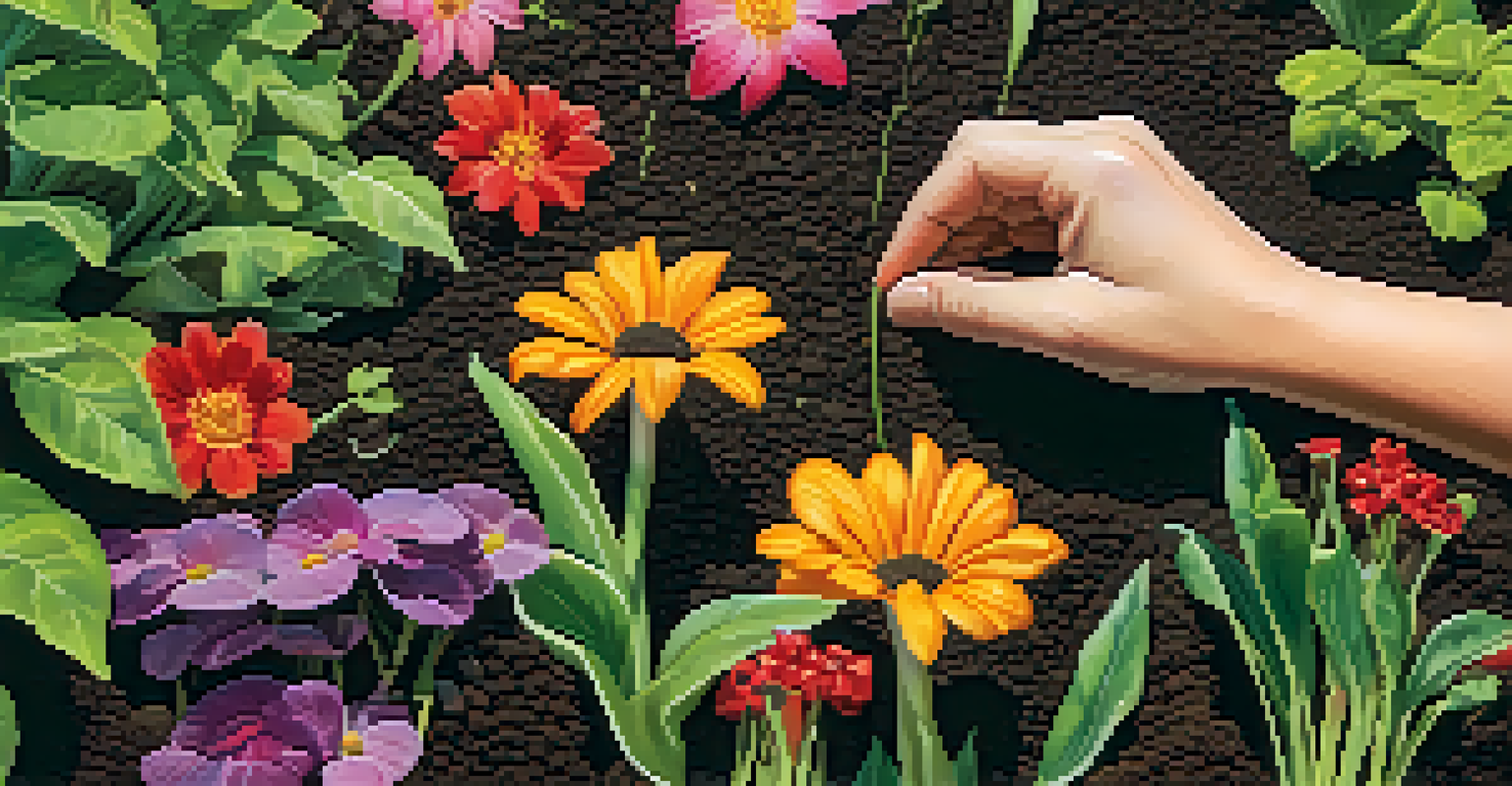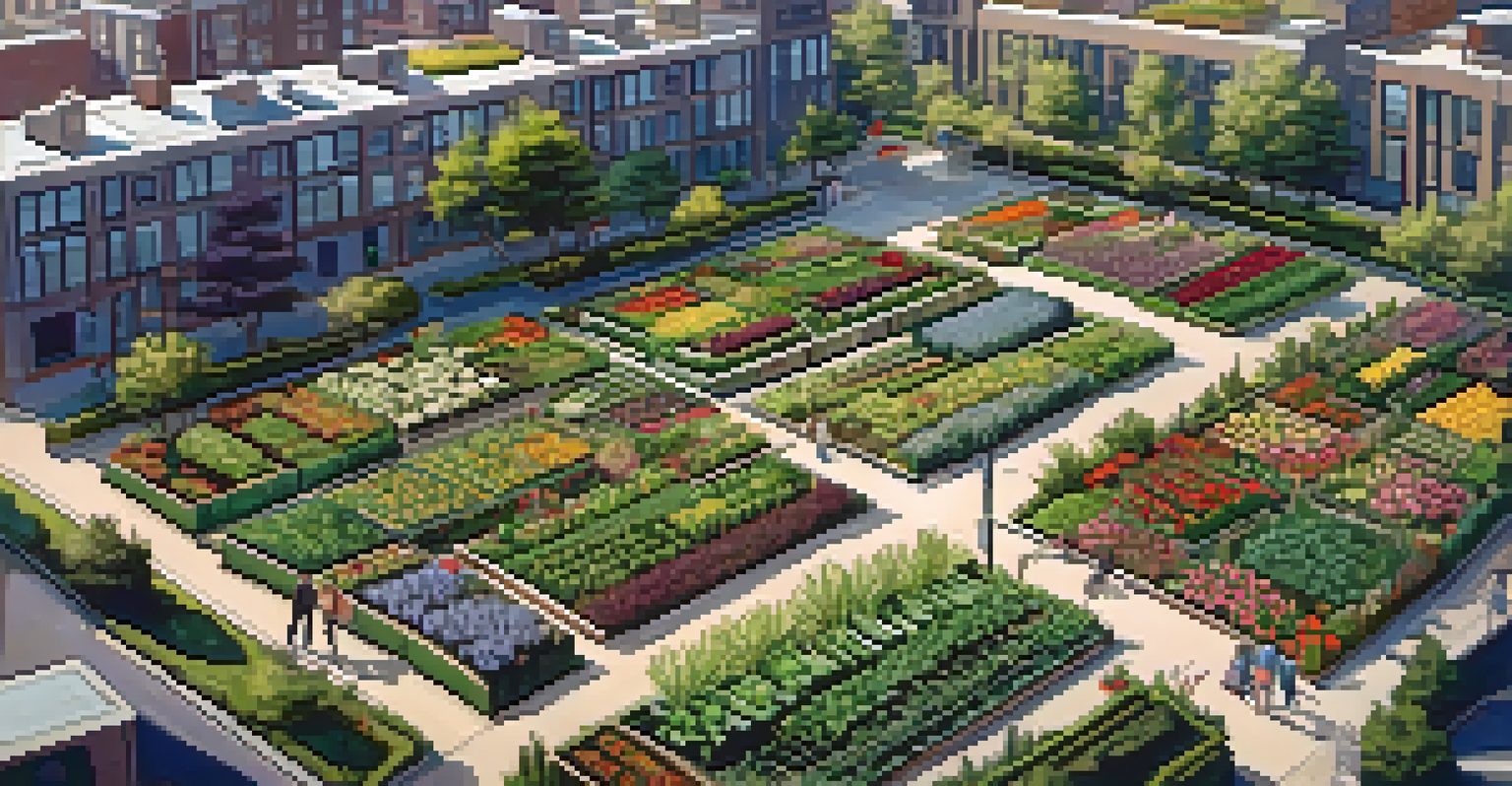Community Gardens: Cultivating Local Food Systems in Chicago

Understanding Community Gardens and Their Importance
Community gardens are shared plots of land where individuals or groups grow plants, often emphasizing vegetables and flowers. These gardens serve as essential spaces for urban agriculture, allowing residents to cultivate fresh produce in areas where access to healthy food is limited. In cities like Chicago, community gardens play a crucial role in promoting food security and fostering a sense of community among neighbors.
The greatness of a community is most accurately measured by the compassionate actions of its members.
The importance of community gardens extends beyond just food production. They act as green lungs for urban areas, improving air quality and providing habitats for various species. Moreover, these gardens create opportunities for education, teaching individuals about sustainable practices, nutrition, and the environment, all while connecting them to the land.
In a bustling city like Chicago, community gardens provide a sanctuary for residents to escape the concrete jungle. They foster relationships and collaboration among community members, creating bonds that can lead to greater civic engagement and social cohesion. Ultimately, they transform underutilized spaces into vibrant hubs of activity, culture, and connection.
The Rise of Community Gardens in Chicago
Chicago has seen a remarkable surge in community gardens over the past few decades, driven by a growing awareness of food justice and sustainability. Various organizations, including local nonprofits and city initiatives, have supported the establishment of these gardens, making it easier for residents to come together and cultivate their own food. This movement reflects a broader trend in urban areas, where people are increasingly recognizing the value of locally sourced produce.

The city’s diverse neighborhoods have embraced this trend, with gardens popping up in places once deemed unsuitable for agriculture. From small backyard plots to larger collective spaces, these gardens cater to a wide range of community needs and preferences. They often reflect the cultural backgrounds of the gardeners, showcasing a variety of plants and crops that represent the rich tapestry of Chicago's population.
Community Gardens Enhance Food Access
Community gardens in Chicago play a vital role in addressing food deserts by providing fresh produce within walkable distances.
Notably, community gardens have also gained traction due to their role in addressing food deserts—areas with limited access to affordable and nutritious food. By providing fresh produce within walkable distances, these gardens empower residents to take control of their food choices, leading to healthier lifestyles and improved community well-being.
The Benefits of Community Gardening
Community gardening offers a multitude of benefits, both for individuals and the community at large. For gardeners, the act of growing food can be therapeutic, providing a sense of purpose and achievement. The physical activity involved in gardening also promotes health, helping individuals stay active while enjoying the outdoors.
Gardening is a way of showing that you believe in tomorrow.
Moreover, community gardens foster social interaction, breaking down barriers and bringing together people from diverse backgrounds. Gardeners often share techniques, recipes, and even harvests, creating a spirit of cooperation and camaraderie. This interaction can lead to lifelong friendships and a stronger sense of belonging within the neighborhood.
Economically, community gardens can contribute to local food systems by reducing food costs for participants and supporting local vendors. By promoting sustainable practices and encouraging residents to grow their own food, these gardens can stimulate economic activity and provide a source of income for local gardeners who sell their produce at farmer’s markets or through community-supported agriculture programs.
Challenges Faced by Community Gardens
Despite their many benefits, community gardens in Chicago face several challenges that can hinder their growth and sustainability. Limited access to land is a significant issue, as urban space is often scarce and expensive. This makes it difficult for new gardens to be established, especially in neighborhoods that would benefit the most from fresh food sources.
Additionally, community gardens require ongoing maintenance and commitment from participants. When interest wanes or gardeners move away, it can lead to neglected plots, which diminishes the garden's appeal and functionality. Securing consistent funding and resources for tools, seeds, and educational programs can also be a hurdle for many community gardens.
Gardens Foster Community Connections
These shared spaces promote social interaction and collaboration, helping to build strong relationships among diverse community members.
Moreover, local policies and zoning regulations can pose obstacles to the establishment and operation of community gardens. Navigating the bureaucracy involved in obtaining permits or securing land can be daunting for community members who are passionate about gardening. Advocating for supportive policies is essential to ensure these gardens can thrive and continue contributing to local food systems.
How to Get Involved with Chicago's Community Gardens
Getting involved with community gardens in Chicago is easier than you might think! Many gardens welcome new members, whether you're an experienced gardener or just starting out. The first step is often to visit the garden, attend a meeting, or reach out to the organizers to learn about volunteer opportunities and membership requirements.
Numerous organizations in Chicago are dedicated to promoting community gardening and can connect you with local plots. Websites like the Chicago Community Garden Association provide valuable resources, including listings of gardens, workshops, and events. Participating in these activities not only helps you grow your gardening skills but also deepens your connection to the community.
If you don't have a garden nearby, consider starting your own! Many urban areas allow for container gardening or small plot gardens, even on balconies or rooftops. Joining forces with neighbors to create a communal space is another fantastic way to cultivate local food systems and share the joys of gardening with your community.
Success Stories from Chicago's Community Gardens
Chicago is home to numerous inspiring success stories that showcase the impact of community gardens on local neighborhoods. For instance, the Peterson Garden Project began with a simple idea: transform vacant lots into thriving gardens. This initiative has not only provided residents with access to fresh produce but has also fostered a sense of pride and ownership among participants.
Another notable example is the Chicago Botanic Garden's Cultivating the Inner City program, which focuses on education and outreach in underserved neighborhoods. Through workshops and hands-on gardening experiences, this program equips community members with the knowledge and skills to grow their own food, ultimately enhancing food security and self-sufficiency.
Sustainable Practices Drive Growth
A growing recognition of the benefits of community gardens is leading to increased support for urban agriculture and local food systems.
These success stories highlight the transformative power of community gardens, demonstrating how they can revitalize neighborhoods, empower individuals, and promote sustainable practices. By sharing these experiences, we can inspire more residents to engage with their local food systems and take part in the gardening movement sweeping across Chicago.
The Future of Community Gardens in Chicago
The future of community gardens in Chicago looks promising, with a growing recognition of their importance in building resilient local food systems. As urban agriculture gains momentum, more residents are likely to engage in gardening initiatives, leading to an expansion of existing gardens and the creation of new ones. This trend will help address food insecurity and promote healthy eating habits across the city.
Furthermore, community gardens are increasingly being integrated into city planning and development discussions. Policymakers are beginning to understand the multifaceted benefits these gardens provide, from environmental sustainability to community health. As a result, we may see more supportive policies and funding initiatives aimed at fostering urban agriculture in Chicago.

Ultimately, the future of community gardens in Chicago hinges on the commitment of residents, local organizations, and government entities to work together. By nurturing these green spaces and investing in sustainable practices, we can cultivate a healthier, more connected community that values local food systems and the joy of gardening.